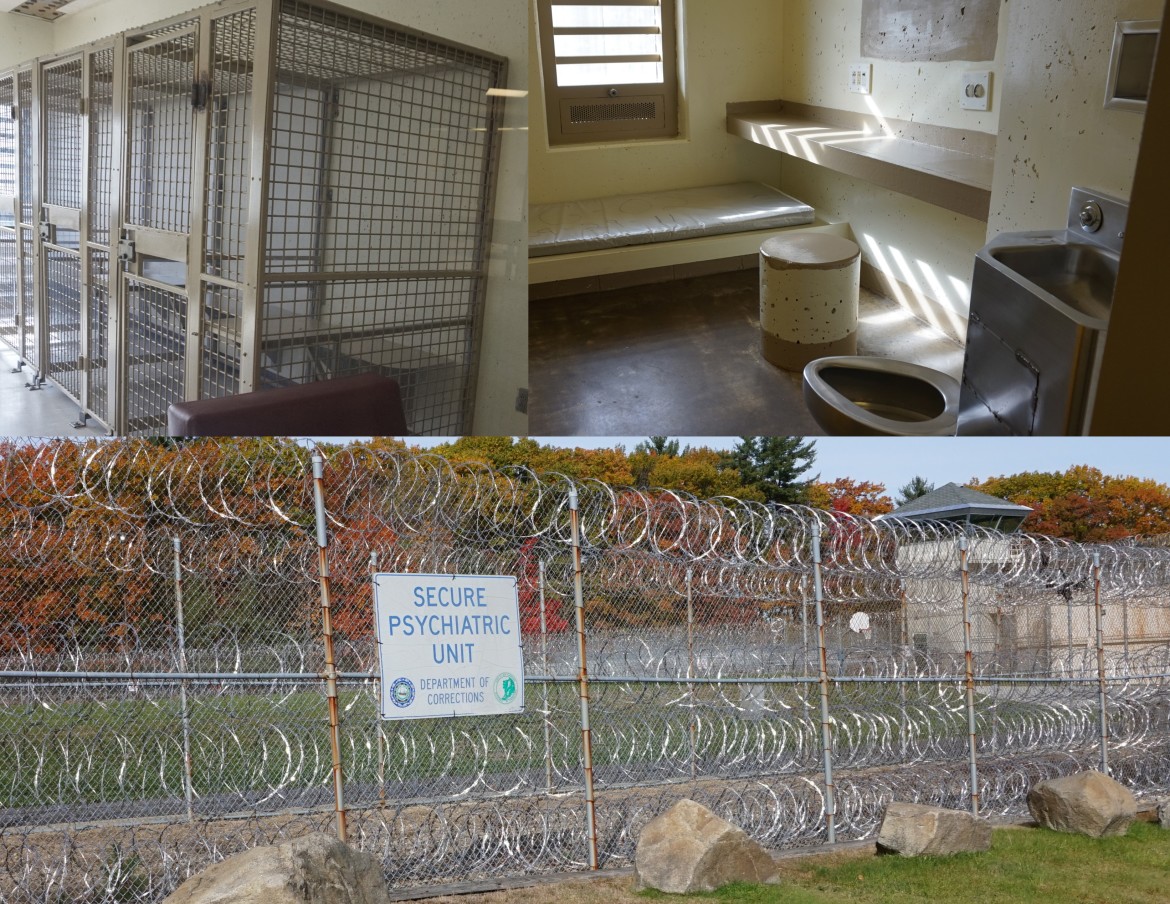
Nancy West photo
Assistant Commissioner of the Department of Corrections Helen Hanks is pictured seated at left next to Paula Mattis, director of Medical and Forensic Services at the Department of Corrections. They both testified Thursday before the House Committee on Health, Human Services and Elderly Affairs.
There was little disagreement at a legislative hearing Thursday that the Secure Psychiatric Unit at the State Prison for Men in Concord is a “dismal” place.
But where else to house the men and women sent to SPU solely because they are mentally ill and a danger to themselves or others weighed on members of the House Committee on Health, Human Services and Elderly Affairs.
There was some disagreement, however, over whether SPU is a hospital or a prison unit.
The committee heard testimony on state Rep. Renny Cushing’s House Bill 1541 that the Hampton Democrat hopes will end the practice of housing non-criminal mentally ill patients in SPU with criminals who are mentally ill.
“That’s not a hospital setting. That’s not a hospital. It’s not a therapeutic setting,” Cushing said of SPU. “The state of New Hampshire needs to step up.”
Cushing said he meant no criticism to the Department of Corrections and believes employees do the best they can with what they have.
SPU is situated on the prison grounds and is under the jurisdiction of the Department of Corrections.
Mentally ill patients who haven’t committed a crime are comingled with mentally ill people who have been convicted of crimes including assault, robbery, sexual assault and murder.
Cushing said the state receives no patient reimbursement from the federal government because SPU is not a hospital.
Paula Mattis, director of medical and forensics at the Department of Corrections, twice referred to SPU as a hospital in her testimony. Beatrice Coulter, a longtime nurse, who resigned after briefly working at SPU, told committee members SPU is not a licensed hospital.
Mattis said: “The secure psychiatric unit, while on the grounds of the state prison for men, is a forensic hospital.”
Mattis took notice of the several comments committee members and those testifying made about the appearance of SPU – that it looks and feels like a prison.
“Yes, we may not be pretty, but the services we provide are a wide range and equal or exceed the level of what other states may offer in similar facilities,” Mattis said.
Mattis said there were 10 patients who were housed at SPU that would be affected by Cushing’s legislation out of a population of 59. The number varies because patients are sent back to New Hampshire Hospital when their condition improves, although some remain in SPU for years.
“(New Hampshire Hospital) sends to us the most extreme cases. I could tell you war stories about that,” but in the interest of brevity, Mattis said, she would move on.
New Hampshire Hospital is the state’s facility to treat mentally ill patients and is under the jurisdiction of the Department of Health and Human Services. The hospital transfers patients to SPU when staff can’t manage them.
The Department of Corrections opposes Cushing’s bill, Mattis said. If passed, the patients affected by the bill would have to be housed out of state, which would hinder their recovery, she said.
Coulter said SPU is not a hospital because it is not licensed by the state and has no entity overseeing its work.
Coulter said she was ethically troubled by what she saw during her brief employment at SPU. After the hearing, she said she believed the civil rights of some patients were violated by comingling non-criminal patients with inmates who have been convicted of crimes.
She also criticized the use of face-down restraint, which she said has been proven to be dangerous to patients.
Elliott Berry, an attorney with New Hampshire Legal Assistance, said he has always been opposed to siting the Secure Psychiatric Unit at the state prison, but worried, too, that Cushing’s bill would cause more patients to be sent out of state.
“The bill as written would substantially increase the number of mentally ill patients transferred out of state,” Berry said. “I can’t think of anything that is more counter-therapeutic than sending people far away from their families.”
Berry said he would enthusiastically support New Hampshire having a mental health facility secure enough to meet the needs of acutely ill and potentially dangerous patients.
As to SPU, “It is a dismal place,” Berry responded to a lawmaker who first made the observation.
The Department of Corrections is doing everything it can, but “you can’t approach the building without feeling you are going to prison,” Berry said.
There was testimony from only one person speaking as a friend of a SPU patient. Tom O’Brien said he visits a friend at SPU who has been held there for more than five years because a judge deemed him incompetent to stand trial.
Still, there has been no workable treatment plan for his friend, he said. “How long does it take?” O’Brien asked.
Cushing said he has long been troubled by housing people who have never committed a crime inside the walls of state prison.
“If we allow people who have never been convicted of a crime to be placed under the jurisdiction of the Department of Corrections, it says a lot about our values,” Cushing said.





